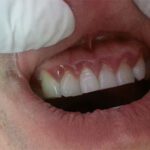
What is your mouth trying to tell you?
If the eyes are the windows to your soul, then your mouth is the gateway to your overall health. Changes in your gums or saliva like color or texture can signal that all’s not well. It can signal diseases in the mouth or it can signal diseases in the body. Once a week, open wide and check for these conditions:
Tongue
Look for: pale color
Might mean: You have iron- deficiency anemia, which affects one in five women. Iron helps produce energy and maintain the immune system and when there is iron deficiency, your body can’t make hemoglobin, which is the pigment in red blood cells, which binds oxygen and carry it to the cells in your body. If you don’t have enough iron in your blood, you’re said to be anemic. You feel weak and dizzy a lot.
What to do: Eat plenty of leafy green veggies, meat, seafood, and beans (or take a supplement; the recommended dose is 15 milligrams). If you suspect you are anemic, see your doctor for a diagnostic blood test.
Saliva
Look for: thick, stringy saliva
Might mean: You have xerostomia (dry mouth). What usually causes this is: Prescription and OTC medications (including allergy, pain, and cold meds) that change the amount of water flowing in and out of cells. Also certain diseases like diabetes and Sjögren’s Syndrome. Dry mouth can lead to tooth decay, gum disease, and oral yeast infections.
What to do: Talk to your doctor/dentist about your medications and dry mouth. Drink more water, chew sugarless gum, and brush with children’s toothpaste or natural toothpaste which typically has fewer drying ingredients. There is also special toothpaste, oral rinse, spray and gum by Biotene. Your dentist can also prescribe saliva stimulators like Salagen or Evoxac. There is also OTC mouth moisturizer like Salivart.
Gums

Look for: bright red color, puffiness, or small abscesses
Might mean: Gum disease— about 80 percent of Americans have gum disease. Even though gum disease is silent, some of the things you can look for is bleeding of your gums when brushing or flossing. In early stages, though there are usually no signs associated with gum disease.
These could signal a bacterial infection. Gum disease can also be a sign of something more serious, such as diabetes. If you’re pregnant, it makes you seven times more likely to deliver your baby too early, according to the American Academy of Periodontology. It appears that gum disease increases the levels of biological fluids that induce labor.
What to do: Make sure you keep your mouth clean by doing a good home care; brushing 3 times a day and flossing once or twice daily. See your dentist twice a year for cleanings. Your dentist may also prescribe a mouthwash containing the antimicrobial chlorhexidine. In cases where you actually do have gum disease, your dentist will recommend a deep cleaning and localized antibiotic therapy.
By: Ladan Zinati

Did you understand your mouth is attempting to inform you something? | St James Dental Group
December 2, 2014[…] What is your mouth telling you […]
Rae
December 14, 2014I didn’t know your mouth can actually show so many different problems in the body! Wow! great article, thanks
admin
December 14, 2014Yes Rae. It sure does. You are welcome.